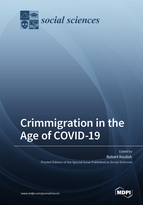Crimmigration in the Age of COVID-19
A special issue of Social Sciences (ISSN 2076-0760). This special issue belongs to the section "International Migration".
Deadline for manuscript submissions: closed (31 July 2021) | Viewed by 34155
Special Issue Editor
Special Issue Information
Dear Colleagues,
Welcome to this Special Issue of Social Sciences, “Crimmigration in the Age of COVID-19”. In recent years, scholarship about the criminalization and securitization of immigration has grown in response to escalating nationalism and right populism in the United States, the UK, and the European Union. The closing of borders has been on the vanguard of growing authoritarian power, racism and the social control of mobility.
This Special Issue will inquire into how COVID-19 has forced new understandings on crimmigration law & politics, including but not limited to new surveillance governmentalities, detention strategies, harsh exclusions, and the reconfiguring of external and internal borders. It will focus on the disproportionate injuries, trauma, and deaths in migrant communities of color, stemming from intersections of crimmigration & border criminologies, public health and national security. Interdisciplinary approaches representing social theory, qualitative and quantitative empirical research & methods, and legal studies are particularly welcome.
Prof. Robert Koulish
Guest Editor
Manuscript Submission Information
Manuscripts should be submitted online at www.mdpi.com by registering and logging in to this website. Once you are registered, click here to go to the submission form. Manuscripts can be submitted until the deadline. All submissions that pass pre-check are peer-reviewed. Accepted papers will be published continuously in the journal (as soon as accepted) and will be listed together on the special issue website. Research articles, review articles as well as short communications are invited. For planned papers, a title and short abstract (about 100 words) can be sent to the Editorial Office for announcement on this website.
Submitted manuscripts should not have been published previously, nor be under consideration for publication elsewhere (except conference proceedings papers). All manuscripts are thoroughly refereed through a double-blind peer-review process. A guide for authors and other relevant information for submission of manuscripts is available on the Instructions for Authors page. Social Sciences is an international peer-reviewed open access monthly journal published by MDPI.
Please visit the Instructions for Authors page before submitting a manuscript. The Article Processing Charge (APC) for publication in this open access journal is 1800 CHF (Swiss Francs). Submitted papers should be well formatted and use good English. Authors may use MDPI's English editing service prior to publication or during author revisions.






